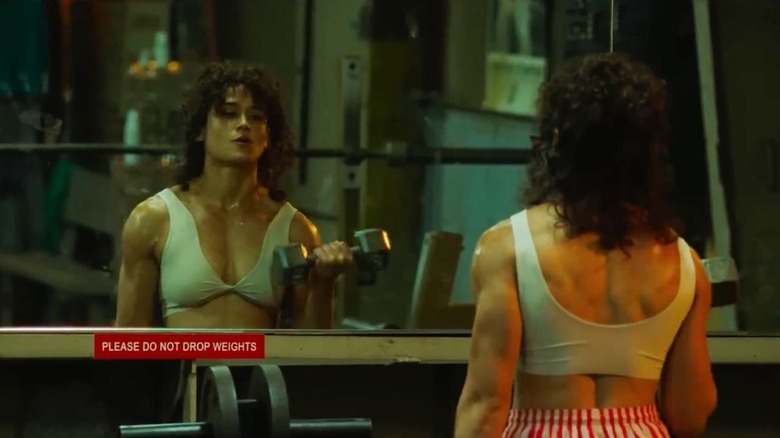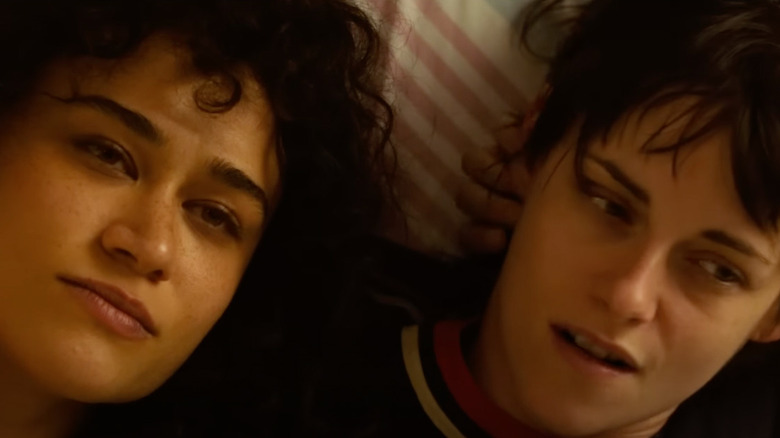Love Lies Bleeding Review: Rose Glass Brings Fluid-Soaked Body Horror To A Compelling, Grimy Noir [Sundance]
Love is one of the biggest anomalies in human evolution. On paper, it should merely be nature's byproduct of the biological urge to propagate the species, an endorphin-induced insurance trap. Love at its most powerful, however, instigates what seems like an almost total transformation within a person: they become stronger, braver, more impulsive, more reckless, and do things they never would have dreamed of doing alone.
One cinematic genre that routinely explores the core of this transformation is film noir. Unlike, say, the cuddlier version of love as seen in the rom-com or the adventure movie, noir tends to encapsulate both the exhilarating and disturbingly dangerous aspects of true love; it can be a character's greatest asset or their Achilles heel, sometimes all at once. It's all a matter of perception.
Perception is something that director and co-writer Rose Glass is explicitly concerned with, and it's her interest in the quality that makes her work so compellingly multi-genre. Her second feature, "Love Lies Bleeding," continues some of the themes begun in her debut, "Saint Maud." While "Maud" was a psychological thriller-cum-religious horror, "Love Lies Bleeding" belongs to the "lovers on the run" subgenre of noir, standing proudly amongst the likes of "Badlands," "Blood Simple," "True Romance," and others. Yet Glass clearly hasn't abandoned horror, either, blending a few choice elements into the film that skew it toward other horror-noirs like "Les Diaboliques," "Lost Highway," and "Drive." With all of that in the mix, "Love Lies Bleeding" transforms into a thrillingly grimy, seedy, Americana-and-fluid-soaked body-horror noir that's unabashedly queer and winningly deranged.
Pump up the jam
A quick note: "body horror" doesn't necessarily have to involve fear or revulsion. The term includes a general fascination or obsession with the body and its functions, the "horror" denoting aspects that polite society would otherwise stray away from. As such, "Love Lies Bleeding" makes its intentions clear right from the start, as it introduces Lou (Kristen Stewart) cleaning the filthy excrement-filled toilets at the gym she operates with a matter-of-fact frankness. It's 1989, and the denizens of Lou's podunk Texas town all live their lives with what seems like a permanent sheen of sweat layered over their skin. Lou's sister, Beth (Jena Malone) is clearly being abused by her loser husband JJ (Dave Franco), and her father, Lou Sr. (Ed Harris), is the public owner of the gym and gun club and private owner of a gun-running crime cabal. Half of the town's population sport mullets (including Lou), and just about every member of the gym she works at is a misogynistic gun-toting dudebro, a huge bummer for an out-and-proud lesbian like Lou.
That all changes the day that Jackie (Katy O'Brian) hitches into town. If Lou and the townies are emblematic of the stagnation of America as they parasitically feed off of each other while spouting hollow epithets of greatness, Jackie is a shining, perfectly coiffed, stunningly muscle-bound anthropomorphic American Dream. A runaway from her religiously strict small town, Jackie is adept at chasing her own dream by any means necessary, at first sleeping with JJ to get a job at Lou Sr.'s gun range, then chatting up Lou herself as the two fall in love at first sight. Jackie needs to get to Las Vegas to compete in a bodybuilding tournament as step one of her path to becoming a trainer in California, and soon enough, Lou becomes part of her vision board, the two genuinely falling in love with one another.
The inevitable complications arise: Lou gets Jackie hooked on illegal steroid shots, injections that seem to be having a very Incredible Hulk-like effect on Jackie's body as well as her mind. Lou's also terrified to attempt to get out from under the thumb of her oppressive and violent father, and can't abide leaving Beth behind with the abusive JJ. After a moment of violence, Lou and Jackie become criminals and hatch a plan to get out of town. Needless to say, things only get messier (literally and figuratively) from there.
Drag the waters until the depths give up their dead
As with any noir worth its salt, "Love Lies Bleeding" is about what's lurking beneath the surface; of these people's minds and bodies, certainly, but also what's literally buried deep in a crack in the Earth out in the desert. As the film's opening shot foreshadows all these secrets clawing their way up into the light, it's made clear very early on that Glass is playing a similar game of perception with her audience that she did in "Saint Maud." While countless films feature such devices as dream sequences, visual hallucinations, and/or flights of fancy, Glass deliberately seeks to blur the lines between what her characters are perceiving versus how events are actually occurring. Just as there are multiple ways to interpret what went down in "Maud," "Love Lies Bleeding" could either be read as a fairly straightforward crime noir, or as a noir that happens to involve a special type of steroid that induces horrific hallucinations before transforming Jackie into some form of superhero.
In either case, the answer is not the point; the emotion is paramount. As with most noir films, everyone is following their hearts here and not their brains (despite some protests to the contrary), and as with most "lovers on the run" films, the lovers are beset on all sides by obstacles attempting to snuff out their flame. Despite all the stylistic flourishes (including a jaw-droppingly squelchy sound design by Paul Davies), "Love Lies Bleeding" feels refreshingly honest in its depiction of love and how messy it can be. Stewart and O'Brian have a fantastic chemistry that holds the screen but never feels self-reflexively "movie star-ish," their vibe so down-to-earth that you may be fooled into thinking the film could be naturalistic at times. Meanwhile, Harris is beautifully slimy, the actor's pronounced intensity on display, of course, mixed with a twinkle of what appears to be affection in his eyes; he may be the Devil, but he seems to consider himself a simple family man.
There's a temptation to call "Love Lies Bleeding" a vision of America from an outsider's perspective, with the London-born, Essex-raised Glass taking a skewed look at our greasy, smelly, sex-and-gasoline-fueled history. While that may be so, the film feels more genuine than anything else, a more America than America portrait in the way that some characters may be more human than human. Its core narrative may not be all that surprising or even shocking, but the depiction feels utterly unique and refreshingly progressive in a way that doesn't feel a need to call too much attention to itself. The enigmatic title (seemingly borrowed from one of a handful of pop songs to use the phrase) at first feels ominous, and certainly could refer to one of the corpses found in the film. Yet it could also be read as less threatening, and even more erotic: bodies excrete, bodies bleed, but that is also a sign of vitality as much as mortality. It's all a matter of perception, you see.
/Film Rating: 9 out of 10


